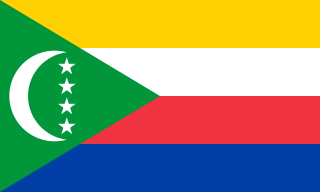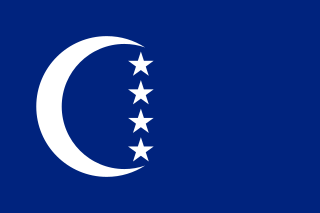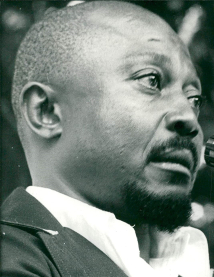
The Comoros, officially the Union of the Comoros, is an archipelagic country made up of three islands in Southeastern Africa, located at the northern end of the Mozambique Channel in the Indian Ocean. Its capital and largest city is Moroni. The religion of the majority of the population, and the official state religion, is Sunni Islam. Comoros proclaimed its independence from France on 6 July 1975. The Comoros is the only country of the Arab League which is entirely in the Southern Hemisphere. It is a member state of the African Union, the Organisation internationale de la Francophonie, the Organisation of Islamic Co-operation, and the Indian Ocean Commission. The country has three official languages: Shikomori, French and Arabic.
The history of the Comoros extends back to about 800–1000 AD when the archipelago was first inhabited. The Comoros have been inhabited by various groups and sultanates throughout this time. France colonised the islands in the 19th century, and they became independent in 1975.

The Politics of the Union of the Comoros take place in a framework of a unitary presidential republic, whereby the President of the Comoros is both head of state and head of government, and of a multi-party system. Executive power is exercised by the government. Legislative power is vested in both the government and parliament. The precolonial legacies of the sultanates linger while the political situation in Comoros has been extremely fluid since the country's independence in 1975, subject to the volatility of coups and political insurrection.

Anjouan is an autonomous volcanic island in the Comoro Islands in the southwestern Indian Ocean, part of the Union of the Comoros. It is known in Shikomori as Ndzuani, Ndzuwani or Nzwani, and, until the early twentieth century when the name fell out of general use, in English as Johanna. Historically it was also called Hinzuan or Hanzoan.

Azali Assoumani is a Comorian politician and military officer who has served as the President of the Comoros from 2002 to 2006 and again since 2016, except for a brief period in 2019. He became head of state after staging a coup d'état in 1999 and was elected president in 2002, 2016, 2019 and 2024. He also served as Chairperson of the African Union from February 2023 to February 2024. Assoumani's current presidency has been described as increasingly authoritarian.

The Comoro Islands are a group of volcanic islands in the Mozambique Channel, an arm of the Indian Ocean lying between Madagascar and the African mainland. Three of the islands form the Union of the Comoros, a sovereign nation, while Mayotte belongs to France.

Grande Comore is an island in Comoros off the coast of Africa. It is the largest island in the Comoros nation. Most of its population is of the Comorian ethnic group. Its population as of 2006 is about 316,600. The island's capital is Moroni, which is also the national capital. The island is made up of two shield volcanoes, with Mount Karthala being the country's highest point at 2,361 m (7,746 ft) above sea level. According to the 2009 revision of the constitution of 2002, it is governed by an elected Governor, as are the other islands, with the federal government being much reduced in power. The name Ngazidja is sometimes seen in the now nonstandard form Njazidja.

Ali Soilih M'Tsashiwa was a Comorian socialist revolutionary and political figure who served as the 7th and 8th and 9th and President of the Comoros from 3 January 1976 to 13 May 1978.

Elections in the Comoros take place within the framework of a multi-party democracy and a presidential system. The President and the majority of the seats in the Assembly of the Union are directly elected.

The Governor of Anjouan is the head of Anjouan, one of the three islands of the Union of Comoros. The position was firstly established as the President of Anjouan in 1997 after the Declaration of independence of Anjouan. Secondly the position became President of the autonomous island of Anjouan following the adoption of the Union of Comoros Constitution of 2001.

The Comoros is an island nation in the Indian Ocean, located off the eastern coast of Africa. France first established colonial rule in the Comoros in 1841. Agreement was reached with France in 1973 for the Comoros to become independent in 1978. On 6 July 1975, but the Comorian parliament passed a unilateral resolution declaring independence. The deputies of Mayotte, which remained under French control, abstained. Referendums on all four of the islands excluding Mayotte showed strong support for independence. Ahmed Abdallah proclaimed the Comoros' independence on 5 September 1975 and became its first president.

An independence referendum was held in the Comoros on 22 December 1974. The overall result was a strong "yes" vote, with 94.57% of voters voting for independence and almost all the "no" votes being cast in Mayotte, where there was a majority for remaining under French control. In contrast, on Mohéli only five out of 6,059 votes were against independence. Voter turnout was 93.3%.

Early presidential elections were held in the Comoros on 24 March 2019 alongside regional elections. A second round would have been held on 21 April if required, but incumbent President Azali Assoumani was re-elected in the first round of voting.

Parliamentary elections were held in the Comoros on 19 January 2020; in constituencies where no candidate received a majority, a second round was held alongside local elections on 23 February. The elections were boycotted by the main opposition parties, including the two largest parties in the outgoing Assembly, the Union for the Development of the Comoros and Juwa Party, in protest at constitutional reform and political repression, The result was a landslide victory for President Azali Assoumani's Convention for the Renewal of the Comoros, which won 20 of the 24 elected seats.
Said Ali Kemal was a Comorian politician. He was the son of Prince Saïd Ibrahim Ben Ali and the grandson of Sultan Said Ali bin Said Omar of Grande Comore.
The 2018–2019 Comoran protests were a series of mass protests and a deadly uprisings consisting of strikes, riots, demonstrations, and marches in opposition to president Azali Assoumani in Comoros in 2018–2019.

The Territory of the Comoros was a French overseas territory consisting of the four main Comoro Islands that existed from 1946 to 1975. It was part of the French Union under the Fourth Republic, then part of the French Community established by the Constitution of the Fifth Republic from 1958.

Presidential elections were held in the Comoros on 14 January 2024. Election officials initially announced on 16 January that incumbent president Azali Assoumani had been re-elected with 63% of the vote, with a voter turnout of just 16%. However, the Supreme Court approved a set of results that showed Assoumani receiving 57% of the vote, with voter turnout at 56%.
The 1999 Comorian coup d'état was a two-day long bloodless military takeover in the Comoros led by Colonel Azali Assoumani from April 29 to April 30, resulting in the overthrow of interim president Tadjidine Ben Said Massonde. The coup was ostensibly carried out to restore order and prevent further attacks on Anjouanese residents in Grande Comore amid the country's secession crisis involving the islands of Anjouan and Mohéli.











